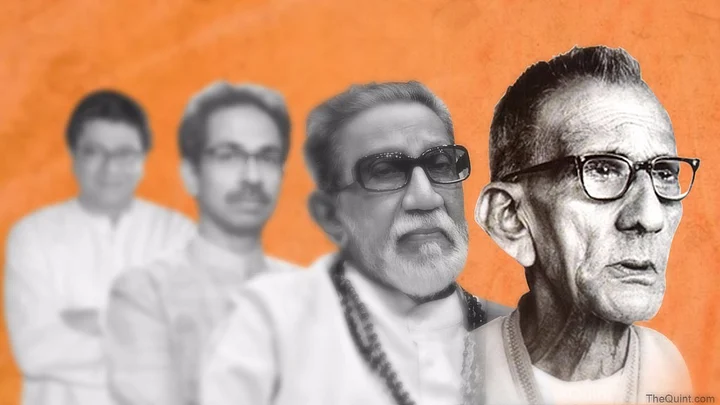A 65-year-old man was getting married to a 12-year-old girl called Manju. A grand pandal was erected for the rich and powerful guests. This was the time when Sarda Bill (Child Marriage Restraint Bill) was being discussed in British India Legislature in late 1920s.
When the old man was about to garland poor Manju, her teenager friend gate-crashed into the venue in a manner that would eventually be known as ‘Bollywood style’! In his firm voice, he asked to stop the wedding! When ignored, he lit a matchstick and actually set the tent on fire!
This boy was Keshav Sitaram Thackeray. It would be unfair to introduce him as the father of Shiv Sena founder Bal Thackeray. Keshav, popularly known as ‘Prabodhankar’ was an eminent social reformer, political activist, author and an editor.
Today, on his death anniversary, let’s get to know 7 things about him that have impacted our lives directly or indirectly. It would also be interesting to find out if Bal Thackeray carried forward his legacy in the true sense.
1. Love Marriages
At a time, when love before marriage was a social taboo, he got dozens of youngsters married. If the shock of ‘love marriages’ was not enough for the society, Prabodhankar ensured inter-cast marriages took place without any opposition.
2. Dowry & Donkeys
Through organisations like Swadhyay Ashram and Govindagraj Mandal, Prabodhankar fought against the social evil of dowry. He would hold protests with donkeys outside wedding venues, where dowry was accepted. He would force the groom to return the dowry to the bride’s father.
3. Anti-Brahminism
When Keshav was a child, he would be asked to sit in a separate line for food at public functions. Even water would be poured into his glass from a distance. This treatment given by Brahmins infuriated the Kayastha child.
When he started reading, he was greatly influenced by the writings of Mahatma Phule, who had fought against the rigid caste system. Later, Prabodhankar not only wrote against the dominance of Brahminism, but toured the then Bombay province holding lectures for a caste-less society.
This brought him closer to Chhatrapati Shahu of Kolhapur and Dr Ambedkar. Since Mahatma Gandhi broke the Brahminical dominance of Tilak, he admired Gandhi. But this admiration was limited as Prabodhankar didn’t approve of the Mahatma’s politics.
4. Bahujan Hindutva
Prabodhankar was a Hindutva-wadi, but his Hindutva was diagonally opposite to that of RSS for two reasons. One, he was a “rationalist” in a limited sense, as he opposed religious rituals by Brahmins or anyone. Two, his followers call him the father of “Bahujan-wadi Hindutva” as it’s the Hindutva sans Brahminical dominance.
When he wanted a Dalit to perform pooja at a Ganpati pandal at Dadar, traditional Brahmins opposed it. So, he started public Navratri at Dadar. Initially, it was a non-Brahmin affair, but now everyone celebrates it across Maharashtra.
5. Uniting All For a Cause
Prabodhankar was one of the prominent leaders of the Samyutka Maharashtra movement in the late 1950s. Since he was not affiliated to any party of ism, he played a crucial role in bringing the Left, Right and Dalits together against Nehru's Congress, which was against formation of a Marathi state with Mumbai as its capital.
6. Prabodhan
When he started Prabodhan (meaning enlightenment), “a fortnightly journal devoted to the social, religious and moral regeneration of the Hindu society”, it became so popular that Keshav Thackeray would be known as ‘Prabodhankar Thackeray’. He wrote over 20 books, which included the biography of Pandita Ramabai, whose immense contribution in the field of women’s education had gotten eclipsed following her embrace of Christianity.
Reading and writing were his passions. His writing was powerful and ruthless at times. He got so impressed by India-born British writer William Makepeace Thackeray, that he changed his spelling from ‘Thakre’ to ‘Thackeray’.
7. Master of Many Arts
Orphaned at an early age, Keshav learnt various arts to run his family. He painted sign boards, tried his hand on photography, made rubber stamps and even worked as a mechanic.
He got in touch with a theatre company and learned to sing and act. He wrote a famous play called ‘Khara Bramhan’ (Real Brahmin) on the life of Saint Eknath. He acted in ‘Shyamchi Aai’, the film that got first Golden Lotus award for the best film in 1954. Interestingly, he acted as a religious preacher, the ones he fought against throughout his life:
Prabodhankar Vs Bal Thackeray
There could be a number of similarities between the father and the son on the level of thoughts, but as far as public personalities go, the differences are stark.
As Pandharinath Sawant, the discipline of Prabodhankar puts it, “Prabodhankar’s Hindutva was not against any religion.” But hatred of Muslims was an integral aspect of Bal Thackeray’s Hindutva. Prabodhankar had convinced Ambedkar for participation of Dalits in Samyumkta Maharashtra movement. Bal Thackeray took an anti-Dalit position during the movement for changing the name of Marathwada university.
Prabodhankar was a face of anti-Brahminical movement. Bal Thackeray gave Maharashtra the first Brahmin Chief Minister in Manohar Joshi. (It should, however, be noted that Prabodhankar was not against all Brahmins; he was against the orthodox ones.)
Prabodhankar was aggressive about women’s rights and education. While credit should be given to Bal Thackeray for encouraging active participation of women in Shiv Sena, the image of women in his mind seems more traditional. The one, who needs to be protected. Shiv Sena could never produce an influential state-level woman leader.
But Bal Thackeray inherited the anti-caste legacy in the sense that he never distributed tickets based on someone’s caste. Many senior journalists say he actually didn’t bother to understand the nitty-gritties of caste structure.
Bal Thackeray shares his memories of his father:
